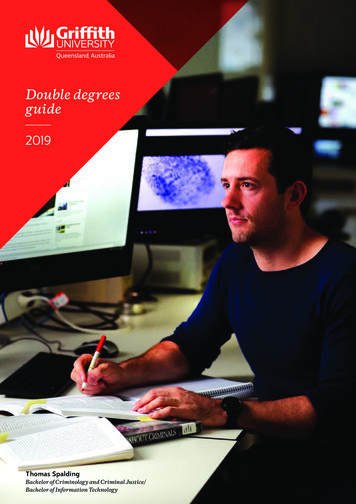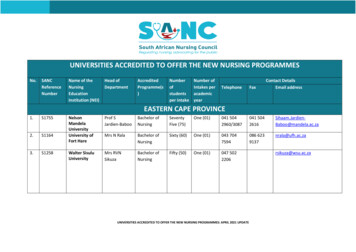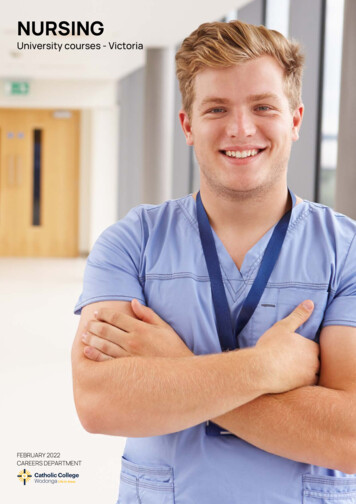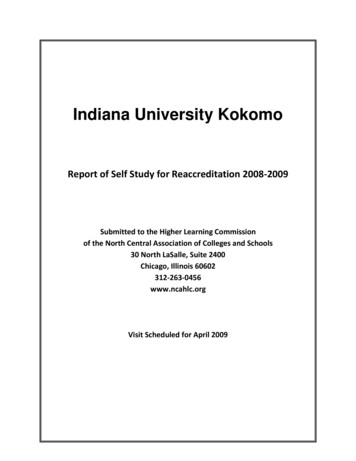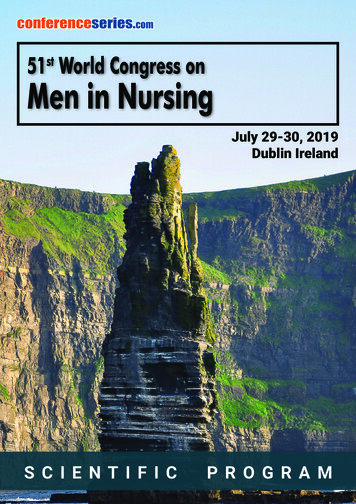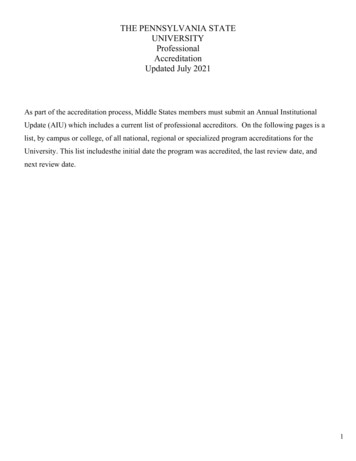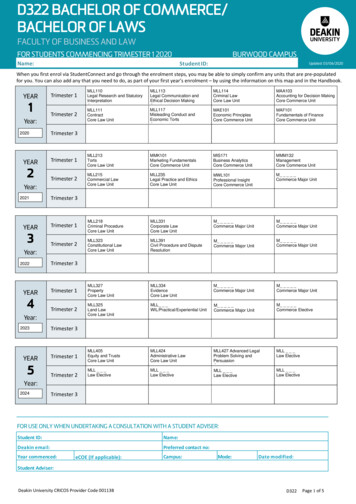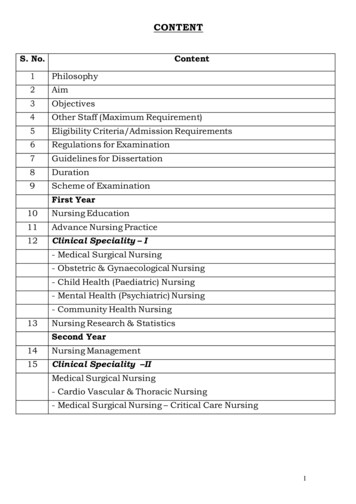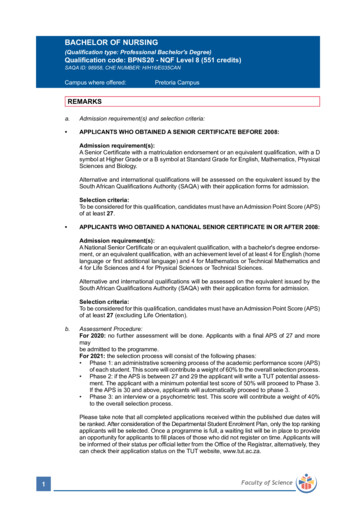
Transcription
BACHELOR OF NURSING(Qualification type: Professional Bachelor's Degree)Qualification code: BPNS20 - NQF Level 8 (551 credits)SAQA ID: 98958, CHE NUMBER: H/H16/E035CANCampus where offered:Pretoria CampusREMARKSa.Admission requirement(s) and selection criteria: APPLICANTS WHO OBTAINED A SENIOR CERTIFICATE BEFORE 2008:Admission requirement(s):A Senior Certificate with a matriculation endorsement or an equivalent qualification, with a Dsymbol at Higher Grade or a B symbol at Standard Grade for English, Mathematics, PhysicalSciences and Biology.Alternative and international qualifications will be assessed on the equivalent issued by theSouth African Qualifications Authority (SAQA) with their application forms for admission.Selection criteria:To be considered for this qualification, candidates must have an Admission Point Score (APS)of at least 27. APPLICANTS WHO OBTAINED A NATIONAL SENIOR CERTIFICATE IN OR AFTER 2008:Admission requirement(s):A National Senior Certificate or an equivalent qualification, with a bachelor's degree endorsement, or an equivalent qualification, with an achievement level of at least 4 for English (homelanguage or first additional language) and 4 for Mathematics or Technical Mathematics and4 for Life Sciences and 4 for Physical Sciences or Technical Sciences.Alternative and international qualifications will be assessed on the equivalent issued by theSouth African Qualifications Authority (SAQA) with their application forms for admission.Selection criteria:To be considered for this qualification, candidates must have an Admission Point Score (APS)of at least 27 (excluding Life Orientation).b.Assessment Procedure:For 2020: no further assessment will be done. Applicants with a final APS of 27 and moremaybe admitted to the programme.For 2021: the selection process will consist of the following phases: Phase 1: an administrative screening process of the academic performance score (APS)of each student. This score will contribute a weight of 60% to the overall selection process. Phase 2: if the APS is between 27 and 29 the applicant will write a TUT potential assessment. The applicant with a minimum potential test score of 50% will proceed to Phase 3.If the APS is 30 and above, applicants will automatically proceed to phase 3. Phase 3: an interview or a psychometric test. This score will contribute a weight of 40%to the overall selection process.Please take note that all completed applications received within the published due dates willbe ranked. After consideration of the Departmental Student Enrolment Plan, only the top rankingapplicants will be selected. Once a programme is full, a waiting list will be in place to providean opportunity for applicants to fill places of those who did not register on time. Applicants willbe informed of their status per official letter from the Office of the Registrar, alternatively, theycan check their application status on the TUT website, www.tut.ac.za.1Faculty of Science
c.Minimum duration:Four years.d.Presentation:Day classes.e.Intake for the qualification:January only.f.Exclusion and readmission:See Chapter 2 of Students’ Rules and Regulations.g.Work-Integrated Learning:Attendance of the allocated Work-Integrated Learning is compulsory. If a student has not completedall Work-Integrated Learning hours in the various clinical areas, including simulated skills andservice learning, he/she will be excluded from proceeding to the next year of study. In addition,students in the fourth year of study should submit the completed midwifery register. Studentswho do not meet the minimum required number of Work-Integrated Learning hours at the endof the fourth academic year will have to re-register to complete the Work-Integrated Learning.A student can only be registered with the South African Nursing Council in the category nurseand midwife once the required number of Work-Integrated Learning hours are completedand all learning objectives are met.h.General information for registration with the South African Nursing Council (SANC):All students undergoing education or training in nursing must apply to the South African Councilto be registered as a learner nurse. Documents must be submitted to SANC within 30 days ofcommencement, therefore all documents must be submitted to the Nursing School before 15February of the relevant year. Failing to do so will result in penalties which will be payable bythe student. Should a student terminate and later resume their nursing studies, terminationand re-registration with SANC as a learner nurse is required. Please contact the academicdepartment for further information.i.Community Service:After completion of this programme, South African Citizens are required to do one yearcommunity service as set out in section 40 of the Nursing Act, 2005 (Act No. 33 of 2005)and in the Regulations Relating to Performance of Community Service published in GovernmentNotice No. 765 of 24 August 2005. Students should note that placement for CommunityService is done by the National Department of Health, the School can therefore not guarantee placement.j.Practicals:It is compulsory for students to attend 100% of the practicals, and they must pass eachpractical component of the Nursing Science subjects separately in order to pass the module.k.Exit-level outcomes: Applies scientific nursing and midwifery skills and technologies in rendering a comprehensive nursing service. Maximises the utilisation of resources to improve the quality of health care and services. Applies the principles of research in nursing and midwifery practice.2l.Other requirements:Students should have professional indemnity during the full period of registration. Textbooksand other educational material will be required. A specific uniform, safety wear and equipmentare compulsory, and a levy will be charged to enable the Department to purchase the necessaryuniforms and equipment for each student.m.Recognition of Prior Learning (RPL), equivalence and status:See Chapter 30 of Students’ Rules and Regulations.Faculty of Science
CURRICULUMFIRST YEARCODEMODULENQF-LCREDITCOE105XCommunication for AcademicPurposeClinical Nurse Training I (WIL)Computer LiteracyNursing Theory and Practice PPREREQUISITE MODULE(S)FIRST c Literacy (block module)General Anatomy IGeneral Physiology ILife Skills (block module)Nursing Ethos and ProfessionalPractice ISECOND SEMESTERGA2116PGMB115PIPN115PGeneral Anatomy IIGeneral MicrobiologyIntroduction to Pharmacology inNursingGeneral Anatomy I127TOTAL CREDITS FOR THE FIRST YEAR:SECOND YEARCODEMODULENQF-LCREDITPREREQUISITE MODULE(S)CNM206PClinical Nurse and Midwife(6)(42)Clinical Nurse Training I (WIL)Training II (WIL)Nursing Theory and Practice INTP206P Nursing Theory and Practice II(6)(24)Clinical Nurse Training I (WIL)General Anatomy IIGeneral Physiology IIntroduction to Pharmacology inNursingNursing Theory and Practice IPSS206P Psycho-Social Science I(6)(12)FIRST SEMESTERGPY216P General Physiology II(6)(12)General Anatomy IIGeneral Physiology IIMW216P Introduction to Midwifery(6)(6)Clinical Nurse Training I (WIL)General Anatomy IIGeneral Physiology INursing Theory and Practice IPSL215PParasitology I(5)(6)RNS216P Introduction to Research I(6)(6)Academic LiteracyCommunication for AcademicPurpose3Faculty of Science
SECOND SEMESTERAPN216PApplied Pharmacology in(6)(6)Nursing IIEMN216P Education and Management in(6)(6)Nursing IHIM216PHealth Information Management II: (6)(6)Data AnalysisNRE216P Nursing Ethos and Professional (6)(6)Practice IIGeneral Physiology IIntroduction to Pharmacology inNursingNursing Theory and Practice IComputer LiteracyNursing Ethos and ProfessionalPractice I132TOTAL CREDITS FOR THE SECOND YEAR:THIRD YEARCODEMODULENQF-LCREDITCNP307PClinical Nurse and Midwife(7)(42)Training III (WIL)MDW307P Midwifery I(7)(24)NTP307P Nursing Theory and Practice III(7)(24)PSS307P Psycho-Social Science II(7)(12)PREREQUISITE MODULE(S)Clinical Nurse and MidwifeTraining II (WIL)Nursing Theory and Practice IIApplied Pharmacology in Nursing IIClinical Nurse and MidwifeTraining II (WIL)General Physiology IIIntroduction to MidwiferyNursing Theory and Practice IIApplied Pharmacology in Nursing IIClinical Nurse and MidwifeTraining II (WIL)Nursing Theory and Practice IIPsycho-Social Science IFIRST SEMESTERHIM317PNRE317PRNS317PHealth Information(7)(6)Management IIINursing Ethos and Professional (7)(6)Practice IIIResearch II: Research(7)(6)Methodology in NursingHealth InformationManagement IINursing Ethos and ProfessionalPractice IIIntroduction to Research ISECOND SEMESTEREMN317PPMF317PEducation and Management in(7)(6)Nursing IIPharmacology in Nursing III:(7)(6)Midwifery and SpecificsEducation and Management inNursing IApplied Pharmacology in Nursing IIIntroduction to Midwifery132TOTAL CREDITS FOR THE THIRD YEAR:FOURTH YEARCODECNP408PMODULENQF-LCREDITClinical Nurse and Midwife(8)(60)Training IV (WIL)4PREREQUISITE MODULE(S)Clinical Nurse and MidwifeTraining III (WIL)Midwifery INursing Theory and Practice IIIFaculty of Science
MDW408P Midwifery II(8)(24)NTP408P Nursing Theory and Practice IV(8)(20)RNS408P Research III: Research Project in (8)(26)NursingClinical Nurse and MidwifeTraining III (WIL)Midwifery INursing Theory and Practice IIIPharmacology in Nursing III:Midwifery and SpecificsClinical Nurse and MidwifeTraining III (WIL)Nursing Theory and Practice IIIPharmacology in Nursing III:Midwifery and SpecificsResearch II: ResearchMethodology in NursingFIRST SEMESTERNRE418PNursing Ethos and Professional (8)(6)Practice IVPDS418P Pharmacology in Nursing IV:(8)(12)DispensingNursing Ethos and ProfessionalPractice IIIMidwifery INursing Theory and Practice IIIPharmacology in Nursing III:Midwifery and SpecificsSECOND SEMESTEREMN418PHIM418PEducation and Management in(8)(6)Nursing IIIHealth Information(8)(6)Management IVTOTAL CREDITS FOR THE FOURTH YEAR:160TOTAL CREDITS FOR THE QUALIFICATION:551Education and Management inNursing IIHealth Information Management IIIMODULE INFORMATION (OVERVIEW OF SYLLABUS)The syllabus content is subject to change to accommodate industry changes. Please note that a more detailed syllabus is available at the Department or in the study guide that is applicable to a particular module. On06 December 2019, the syllabus content was defined as follows:AACADEMIC LITERACY (ALI125X)CONTINUOUS ASSESSMENT(Module custodian: Directorate of Library and Information Services)Introduction of information literacy. Development of a search strategy and application of a search string to searchengines and academic databases. Evaluation of information sources. Ethical and legal use of information. (Totaltuition time: not available)APPLIED PHARMACOLOGY IN NURSING II (APN216P)1 X 3-HOUR PAPER(Module custodian: Department of Pharmaceutical Sciences)This module prepares the student to demonstrate an integrated knowledge of the pharmacological principlesof drugs such as antimicrobials, antiretrovirals and vitamins and minerals. Upon completion of the module,the student will be able to apply and demonstrate the relevant competencies, including the application of theprinciples of pharmacokinetics and pharmacodynamics, adverse effects of drugs and drug calculations. (Totaltuition time: not available)5Faculty of Science
CCLINICAL NURSE AND MIDWIFE TRAINING II (WIL) (CNM206P)WORK-INTEGRATED LEARNING(Module custodian: Adelaide Tambo School of Nursing Science)This module prepares the student to demonstrate an ability to use scientific nursing process in the practiceof nursing to apply standard methods, procedures or techniques within the field, discipline or practice, andto plan and manage an implementation process within a supported environment. The student will be able toapply his/her knowledge of nursing practice to individual patients, families and communities. (Total tuitiontime: not available)CLINICAL NURSE AND MIDWIFE TRAINING III (WIL) (CNP307P)WORK-INTEGRATED LEARNING(Module custodian: Adelaide Tambo School of Nursing Science)This module prepares the student to apply methods of enquiry in nursing and midwifery practice, and their suitability to specific investigations; and an ability to select and apply a range of methods to resolve problems orintroduce change within a practice. The student will be able to apply his/her knowledge of nursing and midwiferypractice to individual patients, families and communities. Upon completion of the module, the student will be ableto perform core nursing and midwifery care of a client in respect of vulnerable patients/clients and those withspecial needs such as children, the aged; youth health and the working community. Providing curative servicesaccording to all the bodily systems as well as midwifery care during childbearing. (Total tuition time: not available)CLINICAL NURSE AND MIDWIFE TRAINING IV (WIL) (CNP408P)WORK-INTEGRATED LEARNING(Module custodian: Adelaide Tambo School of Nursing Science)This module prepares the student to demonstrate understanding of the complexities and uncertainties ofselecting, applying or transferring appropriate standard procedures, processes or techniques to unfamiliarproblems in a nursing and midwifery practice. The student will be able to apply his/her knowledge of nursing and midwifery practice to individual patients, families and communities. Upon completion of the module,the student will be able to perform core nursing and midwifery care of a client in respect of individual, familyand community. Providing prevention, promotion, curative and rehabilitative health throughout lifespan appreciating all the complexities and integrating teams and systems. Upon completion, the student is able todemonstrate an ability to critically review information gathering, synthesis of data, evaluation and management processes in specialised contexts in order to develop creative responses to problems and issues. (Totaltuition time: not available)CLINICAL NURSE TRAINING I (WIL) (CNR105P)WORK-INTEGRATED LEARNING(Module custodian: Adelaide Tambo School of Nursing Science)This module prepares the student to demonstrate an ability to select and apply standard methods, proceduresor techniques within the field, discipline or practice, and to plan and manage an implementation process withina supported environment. The student will be able to apply his/her knowledge of nursing practice to individualpatients, families and communities. Upon completion of the module, the student will be able to perform fundamental nursing care of a client in respect of meeting the need for; homeostasis, ventilation and maintenance,elimination, nutritional, safety, mobility and exercise, comfort rest and sleep; loss and grieving, first aid andhealth promotion including professional self-awareness. (Total tuition time: not available)COMMUNICATION FOR ACADEMIC PURPOSE (COE105X)1 X 3-HOUR PAPER(Module custodian: Department of Applied Languages)A workable knowledge of English is an essential skill for any graduate who is required to conduct themselvessuccessfully in a professional working environment. This module will equip students with the competenciesrequired to compose a selection of written texts related to communicating both internally and externally withina professional environment. In addition, the module includes strategies that are essential for the effective communication in various situations, including small groups to avoid unproductive conflict, a multicultural context,etc. (Total tuition time: not available)COMPUTER LITERACY (CPL105X)CONTINUOUS ASSESSMENT(Module custodian: End User Computing Unit)Introduction of information literacy. Development of a search strategy and application of a search string to searchengines and academic databases. Evaluation of information sources. Ethical and legal use of information. (Totaltuition time: not available)6Faculty of Science
EEDUCATION AND MANAGEMENT IN NURSING I (EMN216P)1 X 2-HOUR PAPER(Module custodian: Adelaide Tambo School of Nursing Science)The student will be imparted with knowledge, skills and professional values regarding fundamentals of nursing unit management, philosophy and the general knowledge of the nursing unit and introduction to educationand personnel development. Adult learning and the role of the professional nurse as teacher will be applied.Upon completion of this module, the student will be able to understand, apply and analyse the fundamentalsof nursing unit management and describe the adult learner in the context of unit management and unit teaching within an ethical and legal framework. (Total tuition time: not available)EDUCATION AND MANAGEMENT IN NURSING II (EMN317P)1 X 2-HOUR PAPER(Module custodian: Adelaide Tambo School of Nursing Science)The student will be equipped with knowledge, skills and professional values regarding Organisation the unitwhich entails; setting priorities, decision making, problem solving and conflict management creating harmonyin the unit. Education and personnel development in health focusses on continuous professional developmentthat is methods of education, learning responsibility and principles of learning and teaching to enhance qualitynursing care within the legal framework in a unit. Upon completion of this module, the student will be able touse decision making manage problems such as conflict, and facilitate teamwork in a unit. (Total tuition time:not available)EDUCATION AND MANAGEMENT IN NURSING III (EMN418P)1 X 2-HOUR PAPER(Module custodian: Adelaide Tambo School of Nursing Science)This module prepares the student to execute the four management principles in the nursing unit. Further,this is including directing in the nursing unit, general principles of directing and leadership styles, financial liabilities, risk management in the unit, communication and relations in the unit, introduction of labour relationsand retention of personnel and application of management process in the nursing unit. Upon completion ofthis module, the student will be able to manage a unit within the legal-ethical framework of Nursing. (Totaltuition time: not available)GGENERAL ANATOMY I (GAN115P)1 X 3-HOUR PAPER(Module custodian: Department of Biomedical Sciences)This equips the student with introductory human anatomy knowledge. The student will be able to apply his/her knowledge of cellular components, tissues, osteology, joints and various organ systems in theoretical andpractical contexts contributing to the body of knowledge necessary in the medical community. Upon completion of the module, the student will be able to identify, explain and apply concepts and principles of cellularform, bones, muscles, and nerves and have a sound knowledge basis of certain organ systems. Studentswill also have the practical skills to be confident in human body structures and their location. (Total tuitiontime: not available)GENERAL ANATOMY II (GAN116P)1 X 3-HOUR PAPER(Module custodian: Department of Biomedical Sciences)This module prepares the student to enter the medical profession with sound human anatomy knowledge.The student will be equipped with knowledge of various organ systems, sensory organs and embryologyanatomy contributing to their understanding of the anatomy of a healthy human body. Upon completion ofthe module, the student will be able to identify, explain and apply concepts and principles of organ systems,sensory organs and embryology anatomy to the extent that they are able to successfully undertake variousdiscipline specific modules related to human anatomy. Students will also have the practical skills to be confident in all human body structures and their location. (Total tuition time: not available)GENERAL MICROBIOLOGY (GMB115P)1 X 3-HOUR PAPER(Module custodian: Department of Biotechnology and Food Technology)This module provides students with introductory general microbiology knowledge. The purpose of the moduleis: to enable students to understand the general microbiology concepts relevant to the field of study; to equipthe students with knowledge on the diversity of microorganisms in terms of their basic morphology and behaviour as they interact with the components of their habitats; to enable students to understand the importanceof prevention of hazards leading to infectious diseases and the control and basic treatment thereof. (Totaltuition time: not available)7Faculty of Science
GENERAL PHYSIOLOGY I (GPY115P)1 X 3-HOUR PAPER(Module custodian: Department of Biomedical Sciences)This module provides the student with introductory human physiology knowledge. The student will be ableto apply his/her knowledge of physiology terminology, cytology (including membrane transport mechanisms,cell cycles etc.), and the functioning of body systems such as the skeletal-, cardiac-, endocrine-, and nervoussystem, in theoretical and practical contexts contributing to the body of knowledge necessary in the medicalcommunity. Upon completion of the module, the student will be able to identify, explain and apply conceptsand processes related to physiology, their control and regulation such as homeostasis, nutrition, movementand reproduction and distinguish between mechanical, biochemical and physical functions in a living systemand how each system integrates with other systems in the human body. Students will also have the practicalskills to be confident in all human body functions and their roles. (Total tuition time: not available)GENERAL PHYSIOLOGY II (GPY216P)1 X 3-HOUR PAPER(Module custodian: Department of Biomedical Sciences)This module prepares the student to enter the medical profession with sound human physiology knowledge.The student will be equipped with knowledge of biochemistry, embryology, sensory organs and the pathophysiology of organ systems contributing to their understanding of the anatomy of a healthy human body.Upon completion of the module, the student will be able to identify, explain and apply concepts and principlesof biochemistry, pathophysiology of organ systems, sensory organs and embryology physiology to the extentthat they are able to successfully undertake various discipline specific modules related to human physiology.Students will also have the practical skills to be confident in all human body functions and their roles. (Totaltuition time: not available)HHEALTH INFORMATION MANAGEMENT II: DATACONTINUOUS ASSESSMENTANALYSIS (HIM216P)(Module custodian: Adelaide Tambo School of Nursing Science)This module introduces the student to basic principles of Health Information Management. The student willbe able to apply his/her knowledge about health information management systems to ensure effective, legaland ethical record keeping. Upon completion of this module, the student will be able to understand, apply,analyse and audit records, documents and processes as integral part of health information management.(Total tuition time: not available)HEALTH INFORMATION MANAGEMENT III (HIM317P)CONTINUOUS ASSESSMENT(Module custodian: Adelaide Tambo School of Nursing Science)This module prepares the student to apply knowledge of health information management to ensure effectivebusiness management and promote health. The student is also introduced to the e-Health strategy of SouthAfrica. Upon completion of this module, the student will be able to understand, apply, analyse and executehealth information management strategies to ensure health promotion and business efficiency. (Total tuitiontime: not available)HEALTH INFORMATION MANAGEMENT IV (HIM418P)CONTINUOUS ASSESSMENT(Module custodian: Adelaide Tambo School of Nursing Science)This module prepares the student to promote health through community involvement by information sharingand collaboration on an ongoing basis. Upon completion of this module, the student will be able to understand, apply, analyse and execute the principles of community assessment, engagement and developmentand health information management to promote community involvement in health care. (Total tuition time:not available)IINTRODUCTION TO MIDWIFERY (IMW216P)CONTINUOUS ASSESSMENT(Module custodian: Adelaide Tambo School of Nursing Science)This module prepares the student to have detailed knowledge of the main areas of the field of Midwiferyincluding an understanding of and ability to apply the State of World Midwifery to the South African contextof Midwifery practice. Further, the student is able to demonstrate an ability to evaluate and apply appropriatemethods of interviewing a pregnant couple, interpreting the information gathered and making a simple midwifery diagnosis. Upon completion of the module, the student will be able to demonstrate the ability to analyseand solve problems of a normal pregnant woman and partner and demonstrate an understanding of theethical implications of decisions and actions within the professional context. (Total tuition time: not available)8Faculty of Science
INTRODUCTION TO PHARMACOLOGY IN NURSING (IPN115P)1 X 3-HOUR PAPER(Module custodian: Department of Pharmaceutical Sciences)This module introduces the student to pharmacological principles and concepts related to drug administration,drug scheduling, legal aspects and drug allergies. Upon completion of the module, the student will be able todemonstrate the basic competencies such as drug calculation, application of drug abbreviations and the listing of common drug side-and adverse effects and the supplication of the ethical and legal aspects, concerningnursing and midwifery. (Total tuition time: not available)INTRODUCTION TO RESEARCH I (RNS216P)1 X 3-HOUR PAPER(Module custodian: Adelaide Tambo School of Nursing Science)The student will be able to apply his/her knowledge of research to the clinical areas of nursing, midwiferyincluding mental health nursing practice and in the community with reference to the introduction to research,the research process, ethics and finding information. Upon completion of the module, the student will be ableto demonstrated knowledge, comprehension and application of research understanding when providing evidence based care; to demonstrate guided response in gaining the skill of academic reading, use of academicwriting skills in writing assignment including citing and proper referencing using appropriate c-referencingstyle. (Total tuition time: not available)LLIFE SKILLS (LFS125X)CONTINUOUS ASSESSMENT(Module custodian: Directorate of Student Development and Support)Academic, personal and socio-emotional skills development for students in higher education. Personal andsocial dimensions address: effective planning and self-management (goal setting and time management); Adjusting to university life (student life, diversity and change); Intra- and interpersonal skills development (conflictmanagement, self-esteem, relationship management); Effective living (healthy living, HIV education, substanceabuse); Academic dimension addresses: academic skills for university (e.g. critical thinking, creativity, managingassignments and assessments). (Total tuition time: not available)MMIDWIFERY I (MDW307P)1 X 3-HOUR PAPER(Module custodian: Adelaide Tambo School of Nursing Science)The student will be able to apply his/her knowledge of the care of the woman and family to optimal health, herfamily and baby, pre-partum, intra-partum and post-partum. The student will be enabled to apply knowledgegained to prepare the woman and family for pregnancy and childbirth, conduct a comprehensive assessmentof history taking, a physical examination and interpretation of the findings thereof using varied available technologies. Upon completion of the module, the student will be able to critically reflect on and address complexmidwifery problems, and apply evidenced based solutions to the management of the woman and the family.(Total tuition time: not available)MIDWIFERY II (MDW408P)1 X 3-HOUR PAPER(Module custodian: Adelaide Tambo School of Nursing Science)This module prepares the student to be a critical thinker, using the scientific decision making process tomaintain the optimal health of a woman, her family and baby, (pre-partum, intra-partum and post-partum)through theoretical and practical facilitation. The module enables the student to apply knowledge gained toprepare the woman and family for pregnancy and childbirth, conduct a comprehensive assessment of historytaking, a physical examination and interpretation of the findings thereof using varied available technologies.Upon completion of the module, the student will develop a range of specialised skills to identify, analyse andaddress complex or abstract problems drawing from the body of knowledge and methods appropriate forMidwifery. Finally, she\he will demonstrate the ability to address ethical issues based on critical reflection onthe relevance of different value system contexts. (Total tuition time: not available)9Faculty of Science
NNURSING ETHOS AND PROFESSIONAL PRACTICE I (NRE115P)1 X 3-HOUR PAPER(Module custodian: Adelaide Tambo School of Nursing Science)The module prepares the student to demonstrate clinical judgement and critical thinking in terms of professional conduct. The student will be equipped with knowledge and skills related to areas of Nursing Ethosand Professional Practice, such as nursing as a profession, historical overview of nursing and midwifery, thenurse and midwife as professional practitioner, the legal framework for nursing and midwifery practice andthe regulation of nursing and midwifery practice. Upon completion of this module, the student will be able toidentify, explain, analyse and address contemporary matters in health and nursing by applying professionalknowledge, skills and attitudes related to nursing and health ethics, law and professional practice. (Totaltuition time: not available)NURSING ETHOS AND PROFESSIONAL PRACTICE II (NRE216P)1 X 3-HOUR PAPER(Module custodian: Adelaide Tambo School of Nursi
practical component of the Nursing Science subjects separately in order to pass the module. k. Exit-level outcomes: Applies scientific nursing and midwifery skills and technologies in rendering a compre-hensive nursing service. Maximises the utilisation of resources to improve the quality of health care and services.
